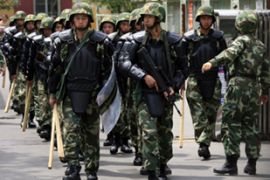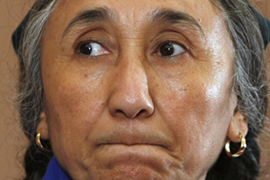More arrests over Urumqi riots
China detains another 319 people suspected of involvement in deadly ethnic riots.

Xinhua said that police would not say how many – if any – of the 1,600 detained earlier have been released.
Last week state media quoted officials as saying the first trials of suspects detained in connection with the violence would begin in the middle of August, but it did not specify the charges the detainees would face at trial.
Internet message
The report of the detentions came as an internet message purportedly from the leader of an Islamic group fighting Chinese rule in Xinjiang urged Muslims around the world to attack Chinese interests in retaliation for what it called the oppression of the Uighurs.
 |
| China continues to blame Rebiya Kadeer for instigating the violence in Urumqi [Reuters] |
The audio recording in the name of Sheikh Abdul Haq al-Turkistani was posted on the web on Sunday, although its authenticity could not be independently verified.
“They [the Chinese] must be attacked inside and outside,” the message said.
“Their embassies, consulates and places where they meet should be targeted to kill their men and capture them to exchange them for our prisoners in Eastern Turkistan.”
China has repeatedly blamed outsiders and the influence of the “three evil forces'” – extremism, terrorism and separatism – but have provided little evidence to support that assertion.
‘Completely fabricated’
Specifically, Beijing has blamed Rebiya Kadeer, an exiled Uighur activist for instigating the recent protests.
Kadeer said last week that up to 10,000 Uighurs disappeared during the recent crackdown, but a Chinese official called the figure “completely fabricated”.
The mainly Muslim Uighurs, China’s sixth largest ethnic minority, say last month’s unrest was touched off when armed police moved in to disperse a peaceful protest in Urumqi called after two Uighur workers were killed in a clash with Han Chinese during a brawl at a toy factory in southern China in June.
The Xinjiang region has long been a hotbed of ethnic tension, fostered by a growing economic gap between Uighurs and the Han Chinese, government curbs on religion and culture, as well as a massive influx of Han migrants who are now the majority in Urumqi.